七年级下册英语知识点
人教版七年级英语下册各知识点归纳总结
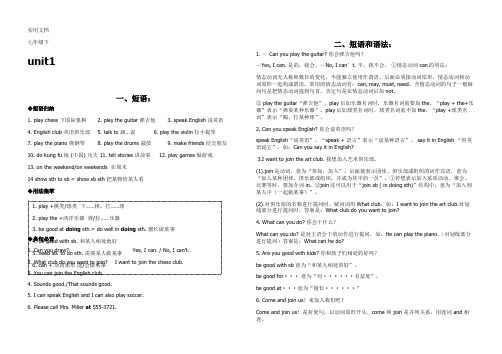
七年级下unit1一、短语:◆短语归纳1. play chess 下国际象棋2. play the guitar 弹吉他3. speak English 说英语4. English club 英语俱乐部5. talk to 跟…说6. play the violin 拉小提琴7. play the piano 弹钢琴8. play the drums 敲鼓9. make friends 结交朋友10. do kung fu 练 (中国) 功夫 11. tell stories 讲故事 12. play games 做游戏13. on the weekend/on weekends 在周末14 show sth to sb = show sb sth 把某物给某人看◆用法集萃◆典句必背1. Can you draw? Yes, I can. / No, I can’t.2. What club do you want to join? I want to join the chess club.3. You can join the English club.4. Sounds good./That sounds good.5. I can speak English and I can also play soccer.6. Please call Mrs. Miller at 555-3721.二、短语和语法:1. — Can you play the guitar? 你会弹吉他吗?—Yes, I can. 是的,我会。
—No, I can’t. 不,我不会。
①情态动词can的用法:情态动词无人称和数目的变化,不能独立使用作谓语,后面必须接动词原形,情态动词和动词原形一起构成谓语。
常用的情态动词有:can, may, must, need。
含情态动词的句子一般疑问句是把情态动词提到句首,否定句是在情态动词后加not。
七年级下册英语必背知识点
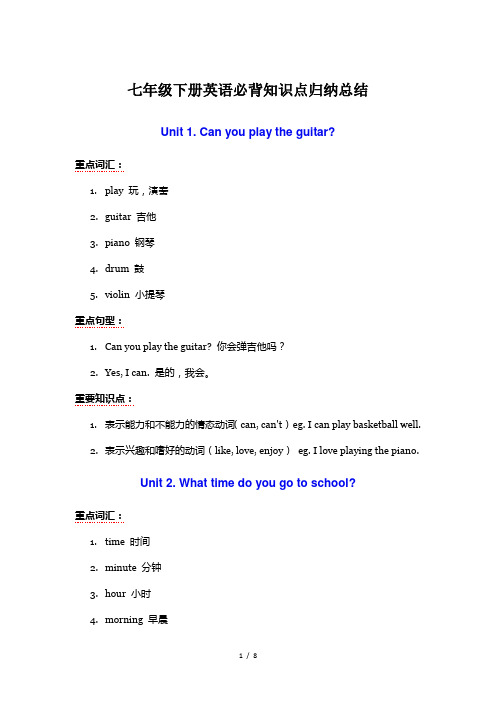
七年级下册英语必背知识点归纳总结Unit 1. Can you play the guitar?重点词汇:1.play 玩,演奏2.guitar 吉他3.piano 钢琴4.drum 鼓5.violin 小提琴重点句型:1.Can you play the guitar? 你会弹吉他吗?2.Yes, I can. 是的,我会。
重要知识点:1.表示能力和不能力的情态动词(can, can't)eg. I can play basketball well.2.表示兴趣和嗜好的动词(like, love, enjoy)eg. I love playing the piano.Unit 2. What time do you go to school?重点词汇:1.time 时间2.minute 分钟3.hour 小时4.morning 早晨5.afternoon 下午6.evening 晚上重点句型:1.What time do you get up? 你几点起床?2.I usually go to school at 7:30. 我通常七点半去上学。
重要知识点:1.表示时间的问答方式和用法eg. What time is it now? It's half past eight.2.表示日常生活习惯的一般现在时eg. I usually do my homework afterschool.Unit 3. How do you get to school?重点词汇:1.bike 自行车2.walk 步行3.bus 公交车4.subway 地铁5.taxi 出租车重点句型:1.How do you get to school? 你怎么去上学?2.I usually take the bus. 我通常坐公交车。
重要知识点:1.表示交通工具的名词和用法eg. I ride a bike to school every day.2.表示方式的副词和表达方式eg. He walks to work every morning.Unit 4. Don’t eat in class.重点词汇:1.don't do sth. 不要做某事2.eat 吃3.drink 喝4.talk 谈话5.listen 听6.music 音乐重点句型:1.Don't talk in class. 上课时不要讲话。
七年级下册英语各单元知识点归纳

七年级下册英语各单元知识点归纳七年级下册英语共有八个单元,包括Unit 1 Making a difference, Unit 2 Great people, Unit 3 Travel journal, Unit 4 Our world, Unit 5 Sharing, Unit 6 Animal world, Unit 7 Science and technology, Unit 8 Sports and health。
下面对每个单元的知识点进行归纳。
Unit 1 Making a difference:1. 基本动词的用法(is/am/are, have/has, do/does)2. 熟练掌握一般现在时的肯定句、否定句和疑问句的构造3. 可数名词和不可数名词的用法及其与冠词的搭配4. 形容词的基本用法5. 过去式动词的构成6. 宾语从句的引导词that的用法Unit 2 Great people:1. 一般过去时的肯定句、否定句和疑问句的构造2. 练习几个表示过去经历的词组和短语,如was/were, went to, saw, met, had等3. 表示习惯的副词 and used to的用法4. 形容词的最高级的构造及用法5. 练习几个形容词的比较级的构成及用法,如big-bigger, good-better, etc.6. 表示过去的时间状语的用法,如in 1998, last week, etc.Unit 3 Travel journal:1. 用there be句型描述地理位置,如There is a park in the town.第1页/共4页2. 学习有关城市、国家和世界各地的基本名称和信息,如countries, continents, cities, etc.3. 学习询问和描述位置的常用句型,如Where is...? It's in/on...4. 学习询问和描述交通方式的常用句型,如How do you go to...? I go by...5. 学习描述天气的常用句型,如What's the weather like? It'ssunny/cloudy/windy, etc.6. 学习描述食物的常用句型,如What do you want to eat? I want to eat...7. 学习描述节日和活动的常用句型,如Is there a...? Yes, thereis./No, there isn't.Unit 4 Our world:1. 学习地点介词的基本用法,如in, on, at等2. 学习描述日常活动的句型,如I get up at 7:00. He goes to school by bike, etc.3. 学习询问和描述时间的句型,如What time do you...? I... at...4. 学习表示频率的副词的用法,如always, usually, often, sometimes, never等5. 学习询问和描述日程安排的句型,如What's your plan for...? My plan is to...6. 练习定语从句的引导词和用法,如who, which, where, when等Unit 5 Sharing:1. 学习权限动词can的用法,表示能力、许可和请求2. 学习询问和描述个人能力的句型,如Can you...? I can...3. 学习谈论和分享个人喜好和兴趣的句型,如I like... I'minterested in...4. 学习询问和描述物品的价钱的句型,如How much is/are...? It's... They're...5. 学习询问和描述购物需求的句型,如What do you want? I want...6. 学习名词性物主代词的用法,如mine, yours, his, hers, etc.7. 学习问路和指示方向的句型,如Excuse me, where is...? It's on the left/right.Unit 6 Animal world:1. 学习动物的基本名称,如lion, penguin, tiger, elephant, etc.2. 学习描述动物外貌和特征的形容词,如big, small, tall, short, etc.3. 学习描述动物习性和动作的动词,如eat, run, swim, fly, etc.4. 学习用there is/are句型描述动物的句型,如There is a lion in the zoo.5. 学习询问和描述动物数量的句型,如How many... are there? There are...6. 学习询问和描述动物食物的句型,如What do... eat? They eat...7. 学习常见的动物园动物和其所属的科,如mammals, birds, reptiles, etc.8. 学习描述动物习性和栖息地的句型,如Lions live in Africa. They sleep in the daytime.Unit 7 Science and technology:1. 学习描述科技产品和设备的基本词汇,如mobile phone, computer, TV, etc.2. 学习询问和描述使用科技产品的方式的句型,如How do you...? I... with...3. 学习科技产品的功能和用途的句型,如What can it do? It can...4. 学习询问和描述科技产品的方便之处和不方便之处的句型,如Is it...? Yes, it is./No, it isn't.第3页/共4页5. 学习描述科技产品的发展和创新的句型,如In the past, people... Now, they...Unit 8 Sports and health:1. 学习描述运动和活动的基本词汇,如play basketball, swim, run, dance, etc.2. 学习询问和描述运动和活动的频率的句型,如How often do you...?I... every...3. 学习询问和描述运动的喜好的句型,如What sports do you like? I like...4. 学习询问和描述身体健康状况的句型,如How are you? I'm (I)have a headache, etc.5. 学习描述饮食习惯和作息时间的句型,如I usually... I go to bed at...6. 学习询问和描述健康建议的句型,如What should I do? You should...7. 学习询问和描述身体部位和病痛的句型,如What's wrong with you?I have a sore throat.以上是七年级下册英语各单元的知识点归纳,希望对你有帮助!。
精编七年级英语下册全部语法知识点总结
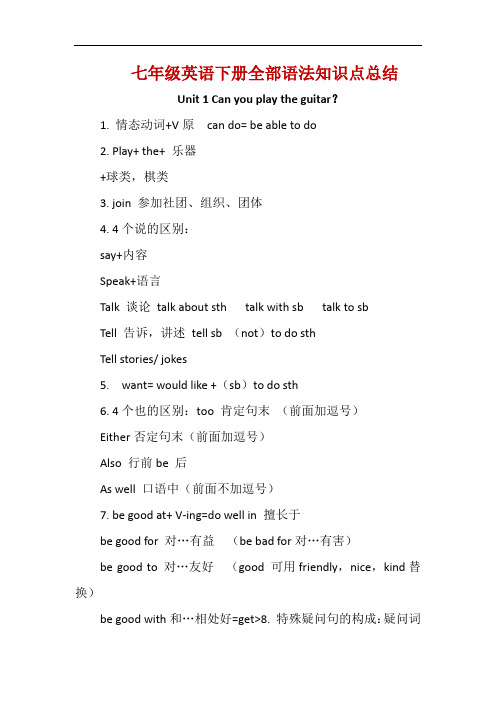
七年级英语下册全部语法知识点总结Unit 1 Can you play the guitar?1. 情态动词+V原can do= be able to do2. Play+ the+ 乐器+球类,棋类3. join 参加社团、组织、团体4. 4个说的区别:say+内容Speak+语言Talk 谈论talk about sth talk with sb talk to sbTell 告诉,讲述tell sb (not)to do sthTell stories/ jokes5. want= would like +(sb)to do sth6. 4个也的区别:too 肯定句末(前面加逗号)Either否定句末(前面加逗号)Also 行前be 后As well 口语中(前面不加逗号)7. be good at+ V-ing=do well in 擅长于be good for 对…有益(be bad for对…有害)be good to 对…友好(good 可用friendly,nice,kind替换)be good with和…相处好=get>8. 特殊疑问句的构成:疑问词+一般疑问句9. How/ what about+V-ing …怎么样?(表建议)10. 感官动词(look, sound, taste, smell, feel)+adj/ like11. 选择疑问句:回答不能直接用Yes或者No,要从中选择一个回答12. students wanted for school show(wanted表示招募,含有被动意义)13. show sth to sb=show sb sthgive sth to sb=give sb sth14. help sb (to)do sthHelp sb with sthWith sb’s help= with the help of sbHelp>15. be busy doing sth/ be busy with sth16. need to do sth17. be free= have time18. have friends= make friends19. call sb at +电话号码20.on the weekend= on weekends21. English-speaking students 说英语的学生(带有连词符,有形容词性质)22. do kung fu表演功夫Unit 2 What time do you go to school?1. 问时间用what time或者whenAt+钟点at 7 o’clockat noon/ at night(during/ in the day)On+ 具体某天、星期、特指的一天on April 1st on Sunday on a cold winter morning In +年、月、上午、下午、晚上2. 时间读法:顺读法逆读法:分钟≤30用pastfive past eight(8:05)half past eight(8:30)分钟>30用to a quarter to ten(9:45)整点用…o’clock 7 o’clock(7:00)3. 3个穿的区别:wear 表状态,接服装、手套、眼镜、香水等Put>Dress 表动作,接sb/>4. from…to…5. be/ arrive late for6. 频度副词(行前be后)Always usually often sometimesseldom hardly never7. 一段时间前面要用介词forfor half an hour for five minutes8. eat/ have…for breakfast/ lunch/ dinner/ supper9. either…or10. a lot of=lots of11. it is +adj+for sb +to do sth (adj修饰to do sth)It is important for me to learn English.it is +adj+of sb +to do sth (adj修饰sb)It is kind/ friendly/ nice of you to help me.12. 感叹句:How+adj+主谓!How+adj+a/an +n单+主谓!What+ a/an +adj+ n单+主谓!What+ adj+ n复/ 不可数+主谓!Unit 3 How do you get to school?1. 疑问词How 如何(方式)how long 多长(时间)答语常用“(For/ about +)时间段”how far多远(距离)答语常用“(It’s +)数词+miles/ meters/ kilometers”how often多久一次(频率)答语常用“Always/ often/ every day/…”或“次数+时间”等表频率的状语How soon多快,多久以后,常用在将来时中。
七年级下册英语知识点总结归纳
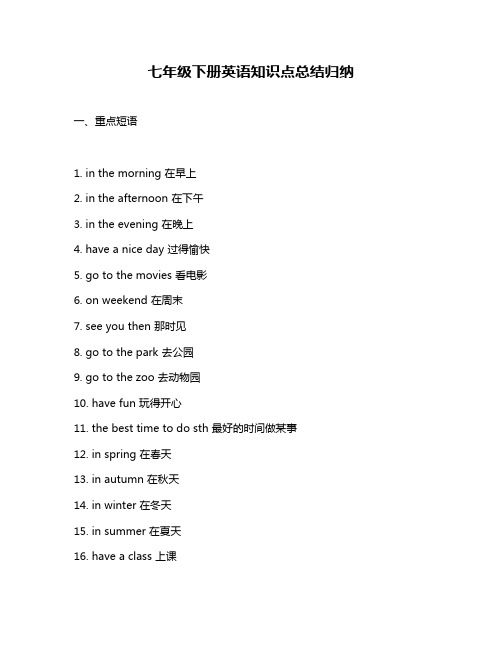
七年级下册英语知识点总结归纳一、重点短语1. in the morning 在早上2. in the afternoon 在下午3. in the evening 在晚上4. have a nice day 过得愉快5. go to the movies 看电影6. on weekend 在周末7. see you then 那时见8. go to the park 去公园9. go to the zoo 去动物园10. have fun 玩得开心11. the best time to do sth 最好的时间做某事12. in spring 在春天13. in autumn 在秋天14. in winter 在冬天15. in summer 在夏天16. have a class 上课17. have a swim 游泳18. have a picnic 野餐19. have a nap 小睡一会20. have fun playing with children 与孩子们一起玩耍21. the next day 第二天22. the day after tomorrow 后天23. the day before yesterday 前天24. the week after next 下下周25. the week before last 上上周26. three days ago 三天前27. two months ago 两个月前28. next Monday 下周一29. last Wednesday 上周三30. three weeks ago 三周前31. five years ago 五年前32. since 自从,因为。
表示一种因果关系,常跟完成时连用。
例如:since you were ill, I have kept you at home。
因为你病了,我一直让你呆在家里。
七年级下册英语单词知识点
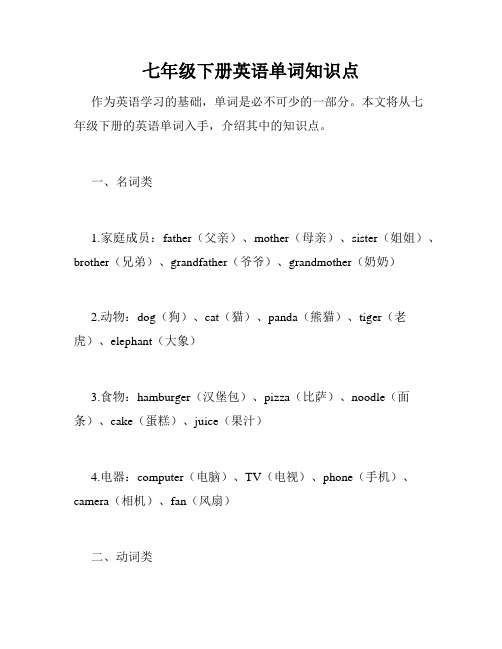
七年级下册英语单词知识点作为英语学习的基础,单词是必不可少的一部分。
本文将从七年级下册的英语单词入手,介绍其中的知识点。
一、名词类1.家庭成员:father(父亲)、mother(母亲)、sister(姐姐)、brother(兄弟)、grandfather(爷爷)、grandmother(奶奶)2.动物:dog(狗)、cat(猫)、panda(熊猫)、tiger(老虎)、elephant(大象)3.食物:hamburger(汉堡包)、pizza(比萨)、noodle(面条)、cake(蛋糕)、juice(果汁)4.电器:computer(电脑)、TV(电视)、phone(手机)、camera(相机)、fan(风扇)二、动词类1.基本动词:be(是)、have(有)、do(做)、go(去)、play(玩)2.日常动词:cook(煮)、clean(打扫)、wash(洗)、read (读)、write(写)3.系动词:look(看起来)、smell(气味)、taste(尝起来)、sound(听起来)、feel(触摸起来)三、形容词类1.颜色:black(黑色)、white(白色)、red(红色)、yellow (黄色)、blue(蓝色)2.形状:round(圆形)、square(正方形)、triangle(三角形)、rectangle(矩形)、oval(椭圆形)3.大小:big(大)、small(小)、long(长)、short(短)、tall(高)四、副词类1.时间:now(现在)、never(从不)、today(今天)、yesterday(昨天)、tomorrow(明天)2.程度:very(非常)、quite(相当)、a little(有点)、not at all(一点也不)、too(太)3.频率:always(总是)、often(经常)、sometimes(有时候)、seldom(很少)、never(从不)五、介词类1.方位:in(在里面)、on(在上面)、under(在下面)、above(在上方)、behind(在背后)2.时间:in(在某一段时间内)、on(在某一天或者具体时间)、at(在某一个时刻或者场合的时间)、after(在之后)、before(在之前)3.方式:by(通过)、with(携带)、like(像)、from(来自)、to(到)六、代词类1.人称代词:I(我)、you(你)、he(他)、she(她)、it (它)2.物主代词:my(我的)、your(你的)、his(他的)、her (她的)、its(它的)3.指示代词:this(这个)、that(那个)、these(这些)、those(那些)、such(这样的)以上就是七年级下册的英语单词知识点,希望对你的学习有所帮助。
人教版初一英语下册知识点

人教版初一英语下册知识点
以下是初一英语下册部分重点知识点:
1. 一般现在时:表示经常或习惯性的动作或状态,常与always, usually, often, sometimes, every day 等时间状语连用。
2. 现在进行时:表示现在正在进行的动作或状态,常与now, at the moment, Look! Listen! 等时间状语连用。
3. 一般过去时:表示过去某个时间发生的动作或状态,常与yesterday, last week, in 2000 等时间状语连用。
4. 祈使句:用于表达请求、命令、建议或劝告等,通常以动词原形开头,句末用句号或感叹号。
5. There be 句型:表示“某地有某物”,其中be 动词的形式根据主语的单复数形式而定。
6. 形容词和副词的比较级和最高级:用于比较两个或两个以上的人或事物,比较级用于两者之间的比较,最高级用于三者或三者以上的比较。
7. 情态动词:表示能力、可能性、请求、建议、许可等,如can, could, may, might, must, have to 等。
七年级英语下册单元知识点总结
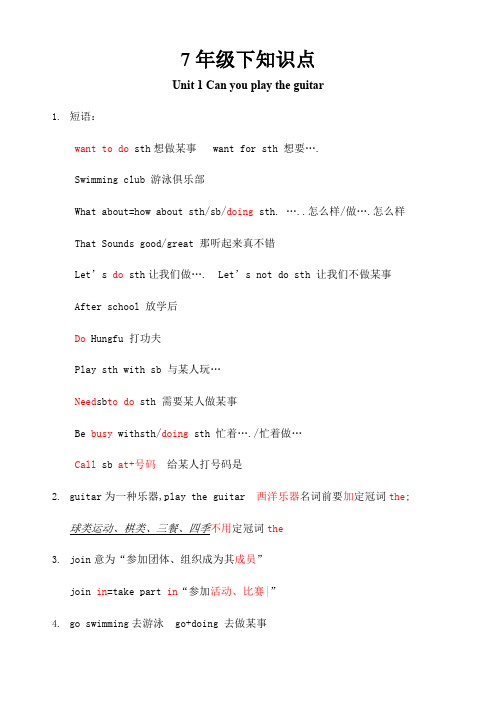
7年级下知识点Unit 1 Can you play the guitar1.短语:want to do sth想做某事 want for sth 想要….Swimming club 游泳俱乐部What about=how about sth/sb/doing sth. …..怎么样/做….怎么样 That Sounds good/great 那听起来真不错Let’s do sth让我们做…. Let’s not do sth 让我们不做某事After school 放学后Do Hungfu 打功夫Play sth with sb 与某人玩…Need sb to do sth 需要某人做某事Be busy withsth/doing sth 忙着…./忙着做…Call sb at+号码给某人打号码是2.guitar为一种乐器,play the guitar 西洋乐器名词前要加定冠词the;球类运动、棋类、三餐、四季不用定冠词the3.join意为“参加团体、组织成为其成员”join in=take part in“参加活动、比赛|”4.go swimming去游泳go+doing 去做某事5.注意区分:speak, say, talk和tella)①say说话 What can you sayb)②speak+语言c)③talk表示两个人或多个人在一起讲话、谈论多指随意谈论talk with sb与某人交谈 talk to sb 向某人说… talk about谈论…;d)④tell的意思是“告诉,讲述,吩咐”,讲故事或讲笑话多用tell;6.Show “表演,演出,出示……给某人看”, show sth. to sb.=show sb. sth.;7.show作名词,意为“展览,展出”on show “在展出” car show 车展;school show 学校公演fashion show 时装表演;a flower show花展8.help sth. 在……方面帮助某人help sth.帮助某人….. help sth.帮助某人干什么;a)I often help him do his homework.b)I often help him his homework.9.be good with... 与……相处得好;与……合得来=get on well withbe good at doing sth擅长做某事 be good for对……有益处;be good to sb 对某人好10.Can you play the guitar你能弹吉他吗情态动词:不能单独做谓语动词;无人称、单复数变化;后接动词原形1.表示能力能;会;如:He can speak English.他会说英语;2.表示许可,意为“可以”,这时可以和may通用,但是比may较正式;如:Can I use your pen我可以用你的钢笔吗3.表示可能性,意为“可能”,这时常出现在否定句中;如:It can’t be true.这不可能是真的;4.表示提供帮助;如:Can you help me你可以帮助我吗1.肯定句:主语+can+动词原形+其他;如:2.否定句:主语+can’t+动词原形+其他;如:3.一般疑问句:Can+主语+动词原形+其他肯定答语:Yes,主语+can.否定答语:No,主语+can’t.如:4.特殊疑问句:疑问词+can+主语+动词原形+其他如:What can I do for you我能为你做点什么呢Unit 2 What time do you go to school1.重点短语:get up 起床 get dressed 穿衣服 get on上车 get off 下车get home到达家中get to work到达工作岗位practice guitar 练吉它 practice doing sth练习做…leave home 离家take a shower = have a shower 洗淋浴澡have/eat breakfast/dinner/lunch 吃早、晚、午饭go to bed 睡觉反义词get upput on 穿衣服反义词take offdo one’s homework 做家庭作业tell sb. about sth. 告诉某人某事love to do = like to do 喜欢干某事 like doing sth at around/about six o’clock 六点左右in the morning/afternoon/evening 在早上/下午/晚上listen to 听…on weekends=at the weekend 在周末on school days 在学校上课日late for… …. 迟到了lots of =a lot of 许多a good /bad habit 好习惯take a walk=have a walk 散步live a happy life 过着幸福的生活2英语时间的表达What is the time 几点了It’s….1直接法:6:10 →six-ten 8:50→eight-fifty6:00 →six o’clocko’clock可省2借助介词to/past分钟数+to/past+小时小于等于30分钟“past” 超过10:15→ a quarter past ten或fifteen past ten 9:30→half past nine或thirty past nine大于30分钟“to”差….到….翻译时要注意时钟要加111:50→ten to twelve9:45→a quarter to ten或fifteen to ten3 what time与when的区别what time “几点”问的是具体的时间,回答要具体到小时;What time do you go to school你什么时候/几点上学when提问,回答既可以是具体的时间,也可以是不具体的时间,如:in the morning,last year,in 1998等范围大的时间;例如:When does he take a shower他什么时候洗澡He takes a shower in the morning.他在早上洗澡;也可用具体时间:I take a shower at 6 o’clock in the morning.我早上六点洗澡;3、 listen to, hear和sound△listen to意为“注意听”,表示有意识地去听,但不一定听得见什么,强调听的动作;They are listening to the teacher. 他们在听老师说;△hear意为“听见”,强调听的结果;如:I’m sorry to hear that.听到那个消息我很难过;△sound意为“听起来,听上去”,可作系动词+形容词The music sounds sweet. 这音乐听起来悦耳;Unit 3 How do you get to school1、重点短语搭配take the subway 乘地铁every day 每天think of 认为 think about 考虑between…and….在…和…之间 next to在旁边come true 实现I think so 我也这样认为I don’t think so 我不这样认为It’s easy /difficult for sb to do sth 对某人而言做什么是很容易/困难的it is easy to get to school到达学校很容易on a ropeway 坐缆索cross the river 穿过河流one 11-year-old boy 一个11岁的男孩红色部分为一个形容词I’m 11years old 我11岁quickly 动作上快 fast 速度上快 soon时间上快the river runs quickly 河水流的快ten minutes’ walk / a ten-minute walk =10 minutes on foot 10分钟的路be afraid to do/ be afraid of sth / doing害怕做某事why not +v原形 == why don’t you +v原形为什么不...........how to do it 怎么来做它what to do 做什么what do you think of =how do you like你觉得怎么样how long does it take sb to do sth花费某人多长时间做某事crossing the river is… 穿过河是…ing型动词做主语谓语动词用单数2、How do you get to school你怎样到达学校交通方式的表达:1 take/ride/drive + a/the +交通工具take a bus/car…2by +交通工具 by bus/car3on/in + a/the +交通工具in:封闭/半封闭/小型工具;on:大型4ride/fly/drive to +交通工具= go to +地点+by+交通工具walk to+地点= go to+地点on foot.eg: I drive to school every day.= I go to school by carI walk to school every day.= I go to school on foot3、spend, cost, pay 与 take区别(1)spendsb spend…on sth或spend…in doing sth.意为“某人花时间/金钱做某事”;eg: I spent 5 dollars on the book.=I spend 5 dollars buying the book.(2)coststh cost sb some money意为“某物花费某人多少钱”;eg: The skirt costs her 200 yuan.(3)paysb pay money for sth.意为“某人为某物付款”;eg: He paid 1000 yuan for the TV set.(4)takeIt takes sb time/ money to do sth.eg: It took him seven days to make the big cake.4、Then the early bus takes him to school.take…to…意为“把…带去…” bring….to….把…带来….5、how far用来提问距离,意为“多远;How far is it from A to B=How far is B from A A 到B有多远①用长度单位表示eg: —— How far is it from your home to the bus stop ——It’s five kilometers.②用时间表示eg: —— How far is the park from the shop——It’s ten minutes’ walk.6、how long 用来提问时间,意为“多久”;eg: —— How long have you been in America—— For two years. for+短时间表示“长达…”7、say, speak, talk与tell8、look, read, see与watch9、there be 句型就近原则There is no bridge=there is not a bride 这儿没有桥◆unit 4 Don’t eat in class.1、重点短语与句型on time准时 in time 及时fight for 为….而斗 fight against 为反对….而战斗 fight with 与…一起战斗go outsider 去外面It’s important for sb to do sth 对…人而言做…是很重要的practice sth/ doing sth 练习…/练习做…do the dishes 清洗餐具make bed 铺床be strict with sb 对某人严格remember/forget to do sth 记得/忘记要做…remember/forget doing sth 记得/忘记做过…follow the rules 遵守规则learn from sb/sth 从…..学习 learn to do sth 学会做某事be late for school 上学迟到have to 不得不don’t have to=needn’t 不必 must 的一般疑问句否定回答school uniform 校服on school nighs 在上学日的晚上too much+不可数名词“太多” too many +可数名词的复数“太多”much too + 形容词/副词“太….”in the kitchen 在厨房let/make/have sb do sth 让某人做某事good luck 好运keep+形容词保持… keep quiet 保持安静=be quietkeepsb doing sth 一直做某事 He keeps me waiting for him a long time. 他让我等了他很久keep sb from doing sth 阻止某人做某事have fun doing sth 很高兴做某事。
七年级英语下册知识点总结(全册人教版)
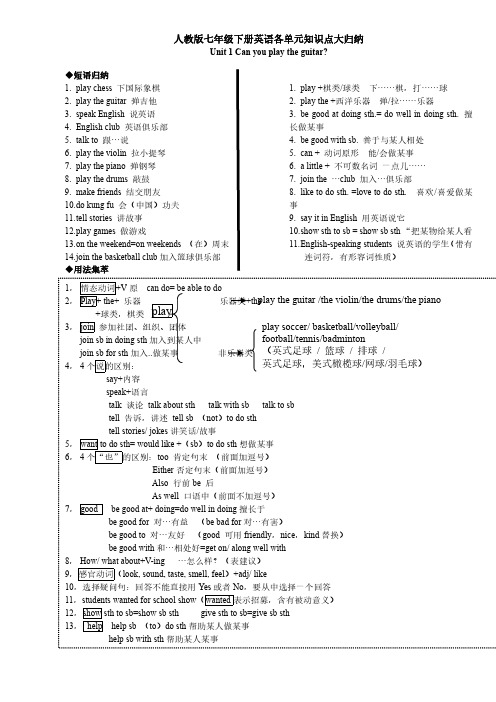
人教版七年级下册英语各单元知识点大归纳Unit1Can you play the guitar?◆短语归纳1.play chess下国际象棋2.play the guitar弹吉他3.speak English说英语4.English club英语俱乐部5.talk to跟…说6.play the violin拉小提琴7.play the piano弹钢琴8.play the drums敲鼓9.make friends结交朋友10.do kung fu会(中国)功夫11.tell stories讲故事12.play games做游戏13.on the weekend=on weekends(在)周末14.join the basketball club加入篮球俱乐部1.play+棋类/球类下……棋,打……球2.play the+西洋乐器弹/拉……乐器3.be good at doing sth.=do well in doing sth.擅长做某事4.be good with sb.善于与某人相处5.can+动词原形能/会做某事6.a little+不可数名词一点儿……7.join the…club加入…俱乐部8.like to do sth.=love to do sth.喜欢/喜爱做某事9.say it in English用英语说它10.show sth to sb=show sb sth“把某物给某人看11.English-speaking students说英语的学生(带有连词符,有形容词性质)◆用法集萃◆典句必背1.Can you draw?Yes,I can./No,I can’t.2.What club do you want to join?I want to join the chess club.3.You can join the English club.4.Sounds good./That sounds good.5.I can speak English and I can also play soccer.6.Please call ler at 555-3721.◆话题写作Dear Sir,I want to join your organization (组织)to help kids with sports,music and English.My name is Mike.I am 15years old.I’m a student in No.1Middle school.I can play the guitar well.I can sing many songs.I can swim and speak English well,too.I think I can be good with the kids.I also do well in telling stories.I hope to get your letter soon.Yours,MikeUnit 2What time do you go to school?◆短语归纳1.what time 几点2.go to school 去上学3.get up 起床4.take a shower 洗淋浴5.brush teeth 刷牙6.get to 到达7.do homework 做家庭作业8.go to work 去上班9.go home 回家10.eat breakfast 吃早饭11.get dressed 穿上衣服12.get home 到家13.either…or…要么…要么…14.go to bed 上床睡觉15.in the morning/afternoon/evening 在上午/下午/晚上16.take a walk 散步17.lots of=a lot of 许多,大量18.radio station 广播电台19.at night 在晚上20.be late for=arrive late for 迟到◆用法集萃◆典句必背1.What time do you usually get up?I usually get up at six thirty.2.That’s a funny time for breakfast.3.When do students usually eat dinner?They usually eat dinner at a quarter to seven in the evening.4.In the evening, I either watch TV or play computer games.1.at +具体时间点在几点(几分)2.eat breakfast/lunch/dinner吃早饭/午饭/晚饭3.thirty\half past +基数词……点半4.fifteen\a quarter to +基数词差一刻到……点5.take a/an +名词从事……活动6.from …to …从……到……7.need to do sth 需要做某事5.At twelve,she eats lots of fruit and vegetables for lunch..6.She knows it’s not good for her,but it tastes good.7.Here are your clothes.◆话题写作主题:谈论日常作息习惯My School DayI am a student.I usually get up at seven,and I eat breakfast at seven thirty.Then I go to school at eight.School starts at eight thirty.I eat lunch at twelve.I go home at17:00.I often eat dinner at19:00and then play the piano.I do my homework at20:00.At22:00,I go to bed.Unit3How do you get to school?◆短语归纳1.get to school到达学校2.take the subway乘地铁3.ride a bike骑自行车4.how far多远5.from home to school从家到学校6.every day每天7.take the bus乘公共汽车8.by bike骑自行车9.bus stop公共汽车站10.think of认为11.between…and…在…和…之间12.one11-year-old boy一个11岁的男孩13.play with…和…玩e true实现15.have to不得不◆用法集萃1.take…to…=go to…by…乘…去…2.How do/does(sb)get to…?…是怎样到…的?3.How far is it from…to…?从…到…有多远?4.It takes sb.some time to do sth.做某事花费某人多长时间。
七年级下册英语单元知识点归纳完整版
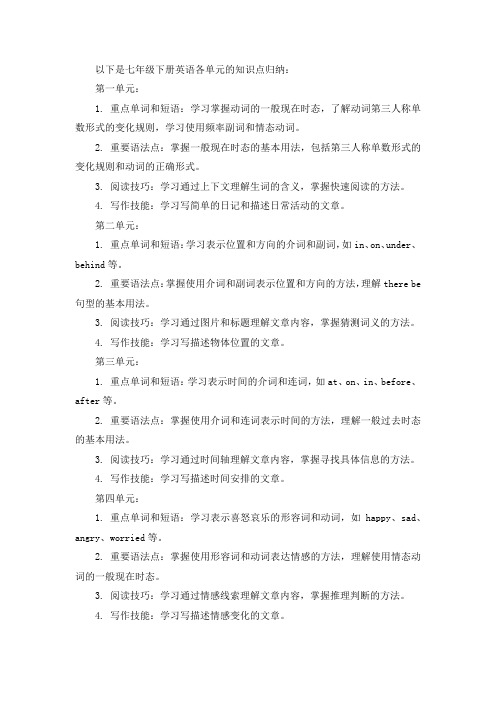
以下是七年级下册英语各单元的知识点归纳:第一单元:1. 重点单词和短语:学习掌握动词的一般现在时态,了解动词第三人称单数形式的变化规则,学习使用频率副词和情态动词。
2. 重要语法点:掌握一般现在时态的基本用法,包括第三人称单数形式的变化规则和动词的正确形式。
3. 阅读技巧:学习通过上下文理解生词的含义,掌握快速阅读的方法。
4. 写作技能:学习写简单的日记和描述日常活动的文章。
第二单元:1. 重点单词和短语:学习表示位置和方向的介词和副词,如in、on、under、behind等。
2. 重要语法点:掌握使用介词和副词表示位置和方向的方法,理解there be 句型的基本用法。
3. 阅读技巧:学习通过图片和标题理解文章内容,掌握猜测词义的方法。
4. 写作技能:学习写描述物体位置的文章。
第三单元:1. 重点单词和短语:学习表示时间的介词和连词,如at、on、in、before、after等。
2. 重要语法点:掌握使用介词和连词表示时间的方法,理解一般过去时态的基本用法。
3. 阅读技巧:学习通过时间轴理解文章内容,掌握寻找具体信息的方法。
4. 写作技能:学习写描述时间安排的文章。
第四单元:1. 重点单词和短语:学习表示喜怒哀乐的形容词和动词,如happy、sad、angry、worried等。
2. 重要语法点:掌握使用形容词和动词表达情感的方法,理解使用情态动词的一般现在时态。
3. 阅读技巧:学习通过情感线索理解文章内容,掌握推理判断的方法。
4. 写作技能:学习写描述情感变化的文章。
第五单元:1. 重点单词和短语:学习表示建议和请求的句型和表达方式,如Can you help me?、How about going shopping?等。
2. 重要语法点:掌握使用情态动词表示建议和请求的方法,理解使用一般现在时态的祈使句。
3. 阅读技巧:学习通过对话理解文章内容,掌握猜测词义的方法。
4. 写作技能:学习写建议信或请求信。
七年级下册1到6单元英语知识点

七年级下册1到6单元英语知识点
以下是七年级下册英语1到6单元的一些主要知识点:
1. Unit 1: Personal Information
-介绍自己的基本信息,如姓名、年龄、国籍等。
-问与回答关于个人信息的问题。
-学习使用形容词来描述自己和他人。
2. Unit 2: School Life
-学习和使用关于学校生活的词汇,如科目、课程表、校园设施等。
-学习描述日常活动和时间表。
-学习使用一般现在时来表达习惯和常规。
3. Unit 3: Hobbies and Interests
-学习和使用关于爱好和兴趣的词汇,如运动、音乐、艺术等。
-学习表达自己的喜好和不喜欢。
-学习使用动词的-ing形式来描述正在进行的活动。
4. Unit 4: Daily Routines
-学习和使用关于日常生活的词汇,如起床、吃早餐、上学等。
-学习描述日常活动的顺序和时间。
-学习使用一般现在时来描述日常例行事务。
5. Unit 5: Food and Health
-学习和使用关于食物和健康的词汇,如水果、蔬菜、饮食习惯等。
-学习表达食物的喜好和不喜欢。
-学习使用情态动词can和should来表达能力和建议。
6. Unit 6: Travel and Transportation
-学习和使用关于旅行和交通的词汇,如旅游景点、交通工具等。
-学习描述旅行计划和行程。
-学习使用一般将来时来表达将来的计划和打算。
七年级下册英语知识点大全
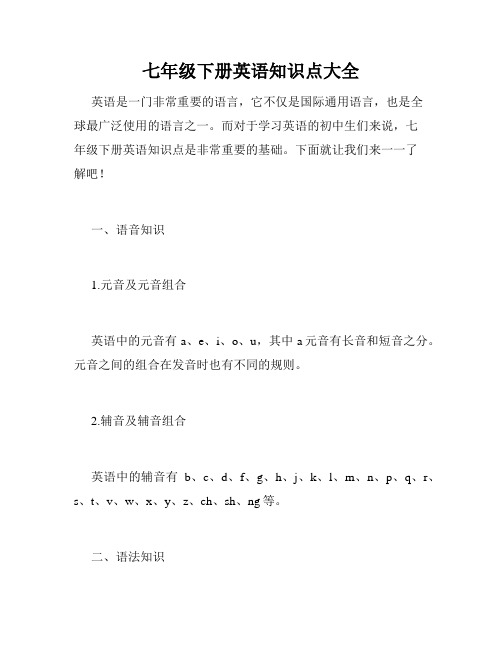
七年级下册英语知识点大全英语是一门非常重要的语言,它不仅是国际通用语言,也是全球最广泛使用的语言之一。
而对于学习英语的初中生们来说,七年级下册英语知识点是非常重要的基础。
下面就让我们来一一了解吧!一、语音知识1.元音及元音组合英语中的元音有a、e、i、o、u,其中a元音有长音和短音之分。
元音之间的组合在发音时也有不同的规则。
2.辅音及辅音组合英语中的辅音有b、c、d、f、g、h、j、k、l、m、n、p、q、r、s、t、v、w、x、y、z、ch、sh、ng等。
二、语法知识1.to be动词的变化be动词在不同的人称、单复数及时态下都有不同的变化。
如:I am, he is, we are等。
2.一般现在时表示现在正在进行的动作或状态,如:I go to school every day.3.一般过去时表示过去已经完成的动作或状态,如:I went to the park yesterday.4.现在进行时表示现在正在进行的动作或状态,并强调正在进行,如:I am reading a book now.5.将来时表示将要发生的动作或状态,如:I will go to the cinema tomorrow.6.形容词和副词的区别形容词用来修饰名词,描述人或物的特征;副词用来修饰动词、形容词或其他副词,描述动作或状态。
7.简单句和复合句简单句由主语和谓语组成;复合句由主句和从句组成。
三、词汇知识1.常用动词be、do、have、go、come、eat、see、get、make、like、want 等。
2.常用名词book、teacher、student、school、classroom、desk、bag、pen、homework、test等。
3.常用形容词和副词good、bad、happy、sad、big、small、fast、slow、hard、easy 等。
4.常用介词和连词in、on、at、with、for、to、and、but、or等。
七年级英语下册-全册知识点梳理
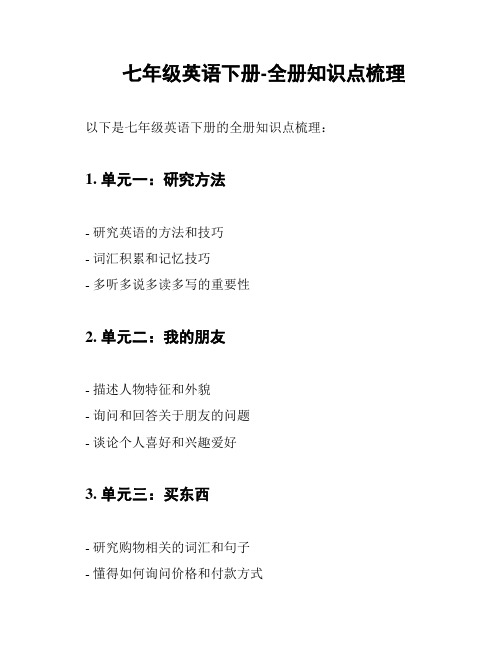
七年级英语下册-全册知识点梳理以下是七年级英语下册的全册知识点梳理:
1. 单元一:研究方法
- 研究英语的方法和技巧
- 词汇积累和记忆技巧
- 多听多说多读多写的重要性
2. 单元二:我的朋友
- 描述人物特征和外貌
- 询问和回答关于朋友的问题
- 谈论个人喜好和兴趣爱好
3. 单元三:买东西
- 研究购物相关的词汇和句子
- 懂得如何询问价格和付款方式
- 学会表达自己的购物意愿和偏好4. 单元四:我的学校
- 研究学校相关的词汇和句子
- 描述学校和课堂环境
- 谈论研究内容和学科
5. 单元五:我的生活
- 研究日常生活相关的词汇和句子- 描述自己的生活惯和家庭
- 谈论日常活动和时间安排
6. 单元六:我的假期
- 研究度假和旅行相关的词汇和句子- 描述过去和将来的假期计划
- 谈论旅行经历和感受
7. 单元七:我喜欢运动
- 研究运动项目和运动器材的词汇
- 喜欢和不喜欢的表达方式
- 谈论个人的体育运动经验和兴趣爱好
这份文档梳理了七年级英语下册的全册知识点,希望对你的学习有所帮助。
七年级下册英语单元全册知识点归纳与复习总结
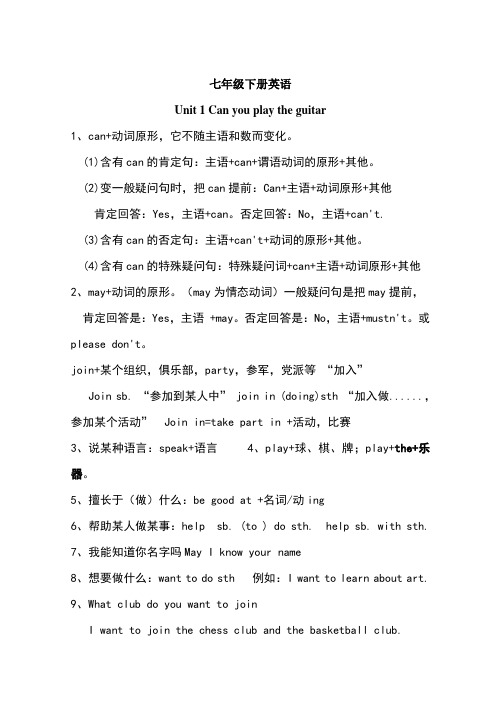
七年级下册英语Unit 1 Can you play the guitar1、can+动词原形,它不随主语和数而变化。
(1)含有can的肯定句:主语+can+谓语动词的原形+其他。
(2)变一般疑问句时,把can提前:Can+主语+动词原形+其他肯定回答:Yes,主语+can。
否定回答:No,主语+can't.(3)含有can的否定句:主语+can't+动词的原形+其他。
(4)含有can的特殊疑问句:特殊疑问词+can+主语+动词原形+其他2、may+动词的原形。
(may为情态动词)一般疑问句是把may提前,肯定回答是:Yes,主语 +may。
否定回答是:No,主语+mustn't。
或please don't。
join+某个组织,俱乐部,party,参军,党派等“加入”Join sb. “参加到某人中” join in (doing)sth “加入做......,参加某个活动” Join in=take part in +活动,比赛3、说某种语言:speak+语言4、play+球、棋、牌;play+the+乐器。
5、擅长于(做)什么:be good at +名词/动ing6、帮助某人做某事:help sb. (to ) do sth. help sb. with sth.7、我能知道你名字吗May I know your name8、想要做什么:want to do sth 例如:I want to learn about art.9、What club do you want to joinI want to join the chess club and the basketball club.10、What club does Tom want to join He wants to join the swimming club .11、He can’t play the violin or the piano. Can you help kids with swimming12、Why do you want to join the English club Because I want to learn English well.Unit 2 What time do you go to school1、what time和when引导的特殊疑问句。
英语七年级下册知识点归纳

七年级下册英语知识点归纳一、词汇1.重点单词-can(情态动词,能、会);dance(跳舞、舞蹈);swim(游泳);sing (唱歌);draw(画画);speak(说、讲);join(参加、加入);club(俱乐部);tell(告诉、讲述);story(故事、小说);write(写作、写字);show (演出、节目);or(或者、也不);talk(交谈、谈话);guitar(吉他);piano (钢琴);violin(小提琴);also(也、而且);people(人、人们);home (家、活动本部);make(使成为、制造);today(在今天、当今);center (中心、中央);weekend(周末);teach(教、讲授)。
-get up(起床、站起);dress(穿衣服、连衣裙);brush(刷、刷净);tooth(牙齿);shower(淋浴、淋浴器);usually(通常地、一般地);forty(四十);never(从不、绝不);early(早的);fifty(五十);job(工作、职业);work(工作);station(电(视)台、车站);o'clock(……点钟);night(晚上、夜晚);funny(奇怪的、滑稽好笑的);exercise(锻炼、练习);best(最好的、最好地);group(组、群);half(一半、半数);past(晚于、过(时间));quarter(一刻钟、四分之一);homework(家庭作业);run(跑、奔);clean(打扫、弄干净);walk(行走、步行)。
- take the subway / train / bus(乘地铁/火车/公共汽车);ride a bike / walk(骑自行车/步行);every day(每天);by bike / bus / subway(骑自行车/乘公共汽车/乘地铁);think of(认为);between…and…(在……和……之间);cross (横过、越过);river(河、江);many(许多);village(村庄、村镇);bridge (桥);boat(小船);ropeway(索道);year(年、岁);afraid(害怕、畏惧);like(像、怎么样);leave(离开、留下);dream(梦想、睡梦);true (真的、符合事实的)。
七年级英语下册知识点总结

• 三. A ______ baby can only cry.
•
A. two month B. two months C. two-month-old D.two months old
• 四.Our school is
[在...对面]my house.
• Look, There is _______ over there. Do you know him?
•
My uncle will leave for the USA.
•
三.离开A地去B地: leave +A + for +B
•
My uncle will leave China for the USA.
• 九、stop 作名词时为“站” bus top
•
作动词时为“停止”,句型为:stop doing sth.停止正在做的事
• He is afraid of dogs.
• He is afraid of crossing the river. • [二]be afraid to do sth. 害怕做某事 He is afraid to go out at night.
• 七、He is like a father to me.
◆句型结构梳理
• 一、距离的表达法 • “A+be+距离+from+B”表示A地离B地有多远 • My home is about 一0 kilometers from school. • “be far away from” 表示离......多远,但是有具体的距离时则不要用far. • My home isn’t far away from the school. • His home is five kilometers away from the school.
- 1、下载文档前请自行甄别文档内容的完整性,平台不提供额外的编辑、内容补充、找答案等附加服务。
- 2、"仅部分预览"的文档,不可在线预览部分如存在完整性等问题,可反馈申请退款(可完整预览的文档不适用该条件!)。
- 3、如文档侵犯您的权益,请联系客服反馈,我们会尽快为您处理(人工客服工作时间:9:00-18:30)。
Unit 1 Can you play the guitar?1.Can you play the guitar?①play sb.sth.”=“play sth.for sb.”表示“为某人播放……”例如: Play me a song=Play a song for me.请为我放一首歌听听吧。
②“play sth.on+乐器”表示“用乐器演奏…”,例如:The girl often play the English song on the piano.这个小女孩经常用钢琴演奏英文歌曲。
③play chess“下国际象棋”,例如: Can you play chess?你会下棋吗?【误区警示】“下棋”用play chess,棋类之前不加冠词。
2..I want to join the art club.我想加入艺术俱乐部。
【用法透析】1)句中join为动词,表示“加入,成为……的一员,连接,结合”等之意。
例如: She wants to join the English club.她想加入英语俱乐部。
Come and join us.来加入我们吧。
Join the two maps togethes.把这两个地图连起来。
2)句中art为“艺术,美术”,如:an art teacher美术老师,an art lesson一堂美术课,an artist一位艺术家2.Can you speak English? 你会讲英语吗?【易混辨析】speak/say/tell/talkspeak意为“说话”,指说话的能力和方式,一般作不及物动词,意为“演讲”,作及物动词时,其后跟某种语言。
例如: Who wants to speak at the meeting? 谁想在会议上发言?Do you speak Chinese? 你会说汉语吗?talk意为“谈话,交谈”,指相互间的谈话,一般作不及物动词时,要谈到某人某事时,后面接介词about 或of。
例如:Don’t talk in class!不要在课堂说话。
Let’s talk to Mr Green.咱们跟格林先生谈谈吧。
say意为“说出,说过”,强调说话的内容。
例如: Can you say it in English? 你能用英语说话吗?They say China is great.他们说中国是伟大的。
tell意为“告诉”、“讲述”,to:Can you tell me about it?你能告诉我有关此事吗?4.Tom can play the quitar but he can’t play it very well.汤姆会弹吉它,但是他弹得不是很好。
【用法透析】1)这是一个由转折连词but连接并列句,前面的简单句是情态动词can的肯定句形式,后面的简单句是情态动词can的否定式。
2)句中veny well意为“很好”,是副词短词,常用来修饰句中的动词,放于句尾。
如: She speaks English very well.她英语说得很好。
5.Are you good with children?你和孩子们相处得好吗?【用法透析】(1)be good with表示“与……相处得好”,例如: My father is good with my mother.我爸爸和我妈妈相处得好吗?(2)be good with的同义表达方式为:get on well with,例如:How do you get on well with your friend? 你和你朋友相处得怎么样?【发散思维】be good at something表示“擅长做某事”,介词at后面可以直接接名词,如果接动词的话,要用动名词形式。
She is good at singing. 她擅长唱歌。
He is good at English. 他擅长英语。
6.Can you help kids with swimming? 你能帮助小孩游泳吗?【用法透析】“help sb.with sth.”表示“帮助某人做某事”,句中的with表示“就某一方面而言”。
例如: Do you often help him with his English? 你经常帮助他学习英语吗?注意:因为with是一个介词,所以其后可跟名词,代词或动名词。
又如: Can you help me with singing? 你会帮助我唱歌吗?He can help me with the box. 他能帮我提那个箱子。
【用法透析】help sb.with sth.的同义句为help sb.to do sth.【发散思维】help作动词,意为“帮助”, help sb.(to) do sth. 这一结构中不定式do sth.前可带不定式符号to,也可不带。
例如:Could you help me(to) open the window? 你能帮我打开这扇窗户吗?He helps me(to) go over my lessons. 他帮我复习功课。
1.Are you a musician?【用法透析】这是个选择疑问句,问话人提出两种或两种以上的情况,让对方选择其中一种回答。
并列的两部分用or连接,or的意思是“或者……”“还是……”等。
若有并列的三部分或更多,用or连接最后两个并列成分,前面的并列成分用逗号隔开。
回答不用“Yes”或“No”,而是从选择中选出一个正确的来回答。
朗读时一般or前部分用升调,or后面部分用降调。
其结构是:“一般疑问句 + or + 供选择部分?”例如:—Is she at home or at school? 她是在家里还是在学校里?—She is at school. 她在学校里。
—Are you Chinese or Japanese? 你是中国人还是日本人?—I’m Chinese.我是中国人。
2.May I know your name?我可以知道你的名字吗?【用法透析】may是情态动词,表示“可以,许可”。
例如:May I come in? 我可以进来吗?May I watch TV after supper? 晚饭后我可以看电视吗?Yes, you may. / No, you mustn't是的,可以。
/ 不,不可以。
【拓展探究】may的用法(1)表示请求、许可、可以May I ask you some questions? 我可以问你一些问题吗?May we start now? 我们现在开始吗?(2)表示推测说话人的猜测,认为某一事情“或许”或“可能”发生。
He may be 25 years old.他可能25岁了。
We may come back in three days.我们可能三天后回来。
(3)may用于感叹句中可以表示祝愿或愿望。
May you success! 祝你成功!May you have a nice trip!祝您旅途愉快!3.Yes,a little.是的,我会画一点儿。
【用法透析】1)本句是针对上句的问话进行回答的,上句:Can you draw?答语为:I can draw a little.3)句中a little意为“一点儿”,在这里可看作是副词短语,修饰句中的动词draw,表示程度,放于句尾。
【拓展探究】a little除了表示“一点儿”,修饰动词,作状语之外,还可修饰不可数名词,如:a little water 一点儿水,a little cola一点可乐,a little milk一点儿牛奶等。
【易混辨析】a few; a little; few; little a few表示“有一点儿”,“有一些”的意思,是肯定的意义。
修饰可数名词。
例如: I'm going to buy a few bananas.我打算买点香蕉。
I have a few apples.我有一些苹果。
I met a few of my friends in the street.我在街上遇见了几位朋友。
a little也可以表示“有一点”,“有一些”的意思,用于肯定的意义。
修饰不可数名词。
在句子里,还可以作状语用,而a few不能用作状语。
例如:"Do you speak Chinese?""Only a little."“你会说汉语吗?”“只会一点点。
”Will you have a little cake? 你吃蛋糕吗?She likes rice and bread a little.她有点喜欢米饭和面包。
few表示“很少”或“几乎没有”的意思,是否定的意义。
用来修饰可数名词。
例如:The problem is very difficult. Few students understand it.这个问题很难,没有几个学生能懂。
The problem is not quite difficult, a few students understand it.这个问题并不很难,有些学生能懂。
little也用来表示“很少”“几乎没有”的意思,是否定的意义。
用来修饰不可数名词。
例如: His uncle had little hair left at the age of fifty.他的叔叔在五十岁时,有很少的头发。
另外a little也表示“一个小的”之意,这时修饰可数名词单数形式,如:a little girl一个小女孩,a little man一个小男人等。
4.Do you have an e-mail address?【用法透析】e-mall是electricmis和 mail合成的缩写词。
electrinic 意为“电子的”,mail意为“邮件”,合在一起意为“电子邮件”。
6.Yes, it’scindyj@有,e-mail地址是【用法透析】句中cindyj@是电子信箱地址,一般说来电子信箱是由“用户名+@+网站名”组成的,例如:WangYiu feng 2003@163. com, Qiu Yong hua @ 等等。
7.Great. Thanks a lot.太好了,多谢。
【用法透析】在口语中,可用“Great”“That's great”“You are great”来表示说话人的赞扬、赞成或兴奋的感情。
Great! 是That's great! 和You're great! 的省略形式,That's great! 指物,You're great!指人,Great! 可指人,也可指物。
